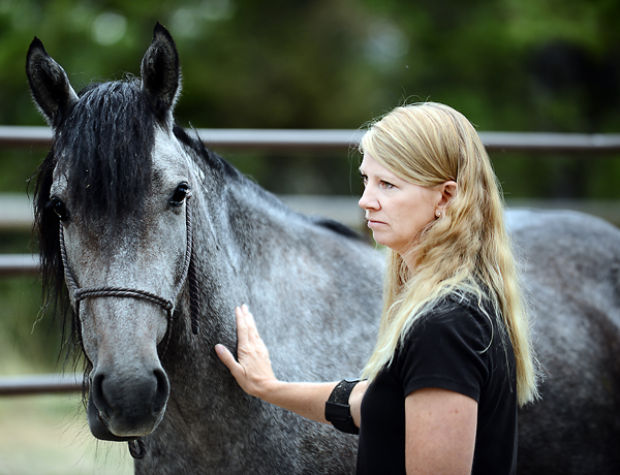KILA, Mont. (AP) — Elisa Wilson took a walk on the wild side and adopted a mustang in May.
The Kila resident has spent months taming and training the wild mustang named Mr. Knightly to compete in the Mustang Million later this month in Texas.
"It took 36 days before we could touch him. Now, we have him gentled. He is a big baby, very affectionate," Wilson said.
Rather than tackle taming the mustang aggressively, Wilson works at Mr. Knightly's pace.
After the 3-year-old mustang accepted being touched, she would add a new activity each day such as putting a rope around his muzzle and picking up each hoof.
Picking up a wild mustang's hooves was a frightening notion.
"When you saw him as a wild horse, saw what he was capable of, it was scary," Wilson said. "That was a huge achievement."
Gaining each other's trust has transformed both of their lives. Getting Mr. Knightly to override instinct and be domesticated has been a slow progression.
"Some of these trainers are riding their horses in a week. I was disappointed that in a month I couldn't touch him, but I'm not a professional trainer," Wilson said. "Eventually, you realize how much you're doing with him and it's very rewarding."
Wilson cultivates her horsemanship while Mr. Knightly learns to become comfortable around people yet retain his curious personality.
"His personality is mellow. He's pretty easygoing, takes things in stride. Very curious," Wilson said.
Both have forged a special bond.
Mustangs are known for their social intelligence, having survived the wild in a band of horses.
"I love quarter horses, but they don't bond the same," Wilson said. "They're just like 'where's the food or let's go for a ride,' where he comes out just to see me, just to hang out with me and be with me."
On Tuesday, the mustang calmly munched hay in his corral at the Kila home of Wilson and her husband. Wilson showed some of the groundwork the pair has accomplished. She put a rope around his neck and walked forward, backward and in circles as Mr. Knightly followed her lead and gait.
"They get a connection with you that is different than other horses," Wilson said. "Even though they are extremely wild, once you gain their trust they are extremely loyal."
Mr. Knightly has formed such a close kinship with another four-legged animal — Bandit, an exuberant black-mouth cur puppy — that it's difficult to imagine the horse once fled at a person's approach.
It wasn't long before Bandit bounded into Mr. Knightly's corral. He licked one of the horse's hooves up to the leg. Mr. Knightly leaned his head down to sniff Bandit. Bandit lifted his head up and their muzzles touch in an Eskimo kiss.
"They do this all the time," Wilson said.
Mr. Knightly went back to munching on a pile of hay while Bandit wiggled on his back in front of the mustang as an invitation to play. The dog then got up and squeezed himself between Mr. Knightly's legs.
Wilson pulled Bandit away from such close proximity to the horse's legs. Mr. Knightly has never responded negatively to Bandit's boundless puppy energy or taken a misstep, but Wilson errs on the side of caution. Her caution has also limited the number of times she has ridden Mr. Knightly — about five — and she always wears a helmet.
The novice horse trainer will put her skills to the test when she competes for monetary prizes, totaling $1 million, at the Mustang Million in Fort Worth, Texas Sept. 16-22.
Although she has ridden Mr. Knightly, she plans to compete in nonriding handling categories.
"I think he's ready now, but a month ago it was pushing him. I want to let him get really good at his groundwork," Wilson said.
The Mustang Million — a partnership between the Mustang Heritage Foundation and the Bureau of Land Management's Wild Horse and Burro program — helps wild mustangs held in government holding facilities get adopted through auctions. These adopted mustangs are eligible to compete in the Mustang Million in novice to advanced riding and nonriding categories.
"They want to promote the mustang and show they can be tamed, they're good-looking animals and they can be useable," Wilson said.
Wilson's dream of owning horses was realized at age 45 when her children were grown. Now 50, Wilson has two quarter horses in addition to Mr. Knightly.
The idea of adopting a mustang came to her after watching a documentary last year called "Wild Horse, Wild Ride," about the competition, known then as the Extreme Mustang Makeover Challenge.
"That got me thinking I could actually do this," Wilson said. "My husband was very supportive."
She did research, went through an application process and was approved. She missed the adoption auctions, but a week later received a call that she could still get a mustang.
"I laughed. I thought this was crazy," Wilson said, noting that she had only gentled a horse once before.
At first she thought she would hire a trainer.
"When you see that movie you'll see what 'wild' really is," Wilson said. "I didn't think I'd be capable of doing it. The more I found out about it I thought, 'I could give this a try.'"
She went to Oregon and picked out Mr. Knightly.
"I think I will only get mustangs from now on," Wilson said. "It just takes a lot of patience. When I got him I would just come out here and sit with him for hours. How many people can say 'I tamed a wild mustang?'"























